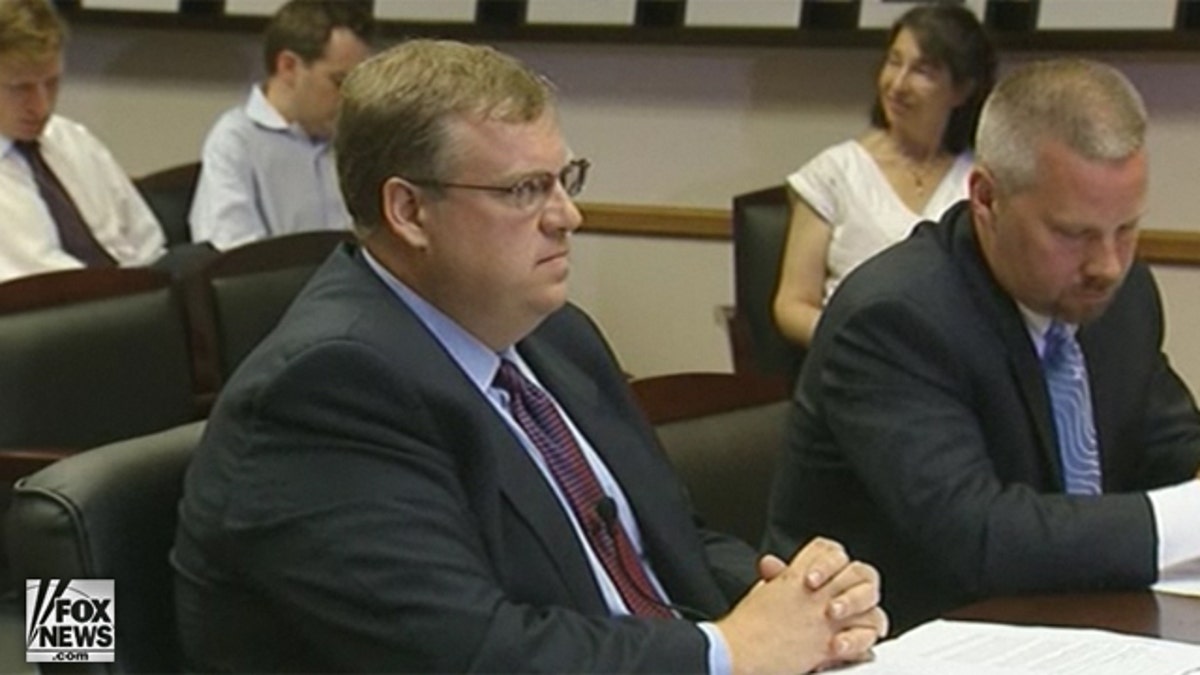
Shown here is former Justice official J. Christian Adams. (FNC)
In emotional and personal testimony, an ex-Justice official who quit over the handling of a voter intimidation case against the New Black Panther Party accused his former employer of instructing attorneys in the civil rights division to ignore cases that involve black defendants and white victims.
J. Christian Adams, testifying Tuesday before the U.S. Commission on Civil Rights, said that "over and over and over again," the department showed "hostility" toward those cases. He described the Black Panther case as one example of that -- he defended the legitimacy of the suit and said his "blood boiled" when he heard a Justice official claim the case wasn't solid.
"It is false," Adams said of the claim.
"We abetted wrongdoing and abandoned law-abiding citizens," he later testified.
The department abandoned the New Black Panther case last year. It stemmed from an incident on Election Day in 2008 in Philadelphia, where members of the party were videotaped in front of a polling place, dressed in military-style uniforms and allegedly hurling racial slurs while one brandished a night stick.
The Bush Justice Department brought the first case against three members of the group, accusing them in a civil complaint of violating the Voter Rights Act. The Obama administration initially pursued the case, winning a default judgment in federal court in April 2009 when the Black Panther members did not appear in court. But then the administration moved to dismiss the charges the following month after getting one of the New Black Panther members to agree to not carry a "deadly weapon" near a polling place until 2012.
In a statement Tuesday, a Justice spokesman said the civil rights division determined "the facts and the law did not support pursuing claims" against the two other defendants and denied Adams' allegations.
"The department makes enforcement decisions based on the merits, not the race, gender or ethnicity of any party involved. We are committed to comprehensive and vigorous enforcement of both the civil and criminal provisions of the federal laws that prohibit voter intimidation," the spokesman said.
The Civil Rights Commission, which subpoenaed Adams, has been probing the incident since last year. Adams said he ignored department directives not to testify and eventually quit after he heard Assistant Attorney General Thomas Perez testify that there were concerns the Black Panther case was not supported by the facts.
Adams has described the case as open-and-shut and said Tuesday that it was a "very low moment" to hear Perez make that claim.
But he described the department's hostility toward that and other cases involving black defendants as "pervasive." Adams cited hostility in the department toward a 2007 voting rights case against a black official in Mississippi who was accused of trying to intimidate voters. Adams said that when the Black Panther case came up, he heard officials in the department say it was "no big deal" and "media-generated" and point to "Fox News" as the source.
But as the investigation unfolded, he said he discovered "indications" that the Black Panther Party was doing the "same thing" to supporters of former presidential candidate Hillary Clinton during the Democratic primary season in early 2008. He urged the commission to pursue testimony from other Justice officials to corroborate his story.
It's unclear how far the commission will get. The commissioners want to hear from Christopher Coates, the former chief of the Justice Department's voting section, but the commission claims the Justice Department is blocking Coates from testifying about why the case was dropped.
In a written statement last week, the department questioned the motives of Adams, now an attorney in Virginia and a blogger for Pajamas Media.
"It is not uncommon for attorneys with the department to have good faith disagreements about the appropriate course of action in a particular case, although it is regrettable when a former department attorney distorts the facts and makes baseless allegations to promote his or her agenda," the statement said.
Adams said Tuesday that his personal views played no part in his handling of the case. He also said he did not fight to testify before the commission but resigned after the department would not take action to quash the subpoena.



